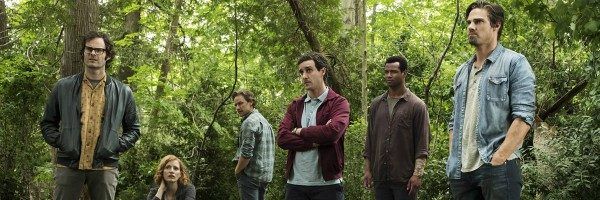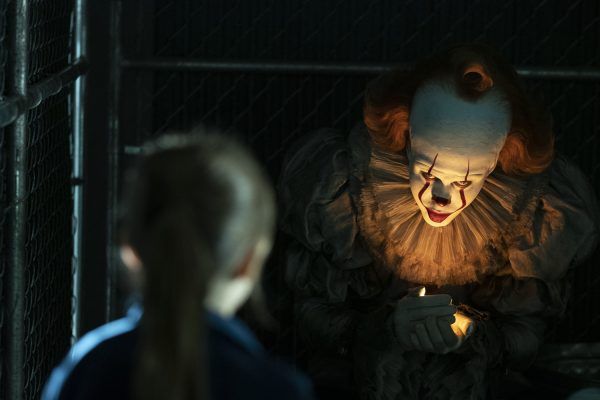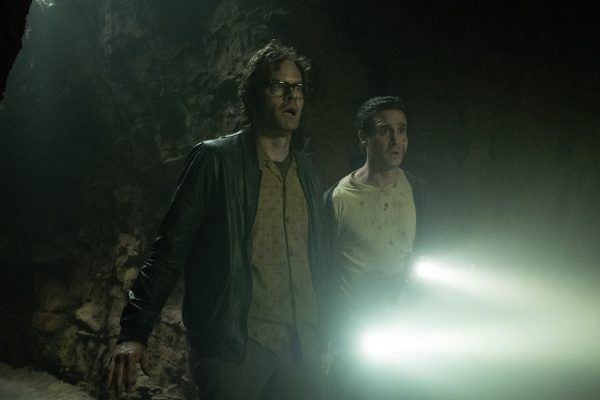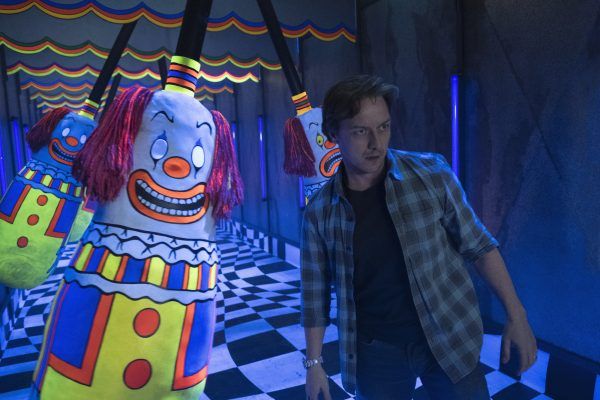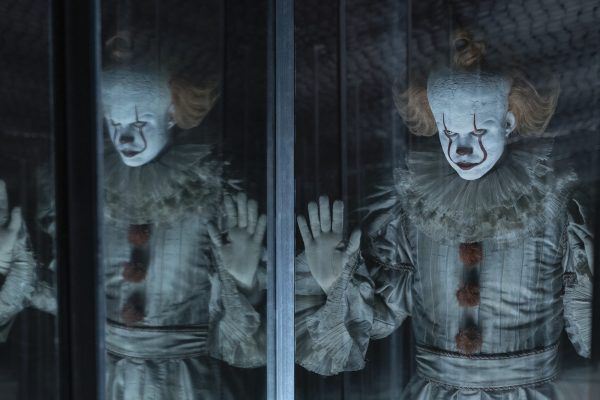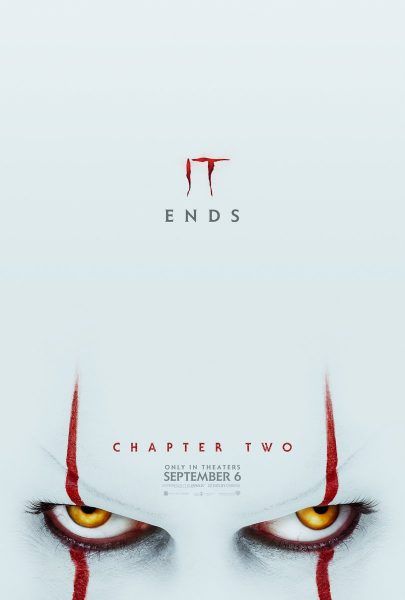*Spoilers ahead for IT Chapter Two and the original Stephen King novel, IT*
As news of IT: Chapter Two's epic two-hour-45-minute runtime rolled out and the trailers really leaned hard into the large-scale "End of a Saga" vibe, I came to expect a lot from Andy Muschietti's follow-up film; huge scares, gut-churning set-pieces, Bill Skarsgård doing that effed-up thing with his eyeball. But I can confidently say that I did not, in a million years, predict that a group of world-class actors viciously screaming "clown! clown!" in unison would be the movie's climactic moment. Yes, after two massive blockbusters, the Losers Club finally emerged from the drainpipes of Derry triumphant by negging Pennywise to death.
Okay, there's more to it than that, a lot more, but it's all jumbled up in failed plans, confused plotting, erratic pacing, and a couple of genuinely heartbreaking performances; the ending of IT Chapter Two is a loud, beautiful, sloppy clusterfuck that is thrilling but doesn't quite work, coming at the tail-end of a movie that is a... loud, beautiful, sloppy clusterfuck that is thrilling but doesn't quite work. And at its center is an odd moral message about what it takes to beat your demons for good. But first, here's the bare bones of what goes down:
Following the events of IT Chapter One, the Losers went their separate ways and formed separate lives; Bill (James McAvoy) is a horror writer searching for a suitable ending, Beverly (Jessica Chastain) is a successful clothing designer trapped in an abusive marriage, Ritchie (Bill Hader) is a famous stand-up comedian, and Eddie (James Ransone) is a risk analyst married to a doppelganger of his overprotective mother. (We don't learn too much about Andy Bean's adult Stanley, other than the fact he's happily married and commits suicide at the thought of returning to his hometown.) But Mike (Isaiah Mustafa) never left Derry. He stayed to study It and the ghoulish spell the clown holds over the community, a search that led Mike to trip absolute balls in the woods with Derry Natives, seeing visions of It crashlanding on Earth from the cosmos thousands of years ago. But more importantly, Mike learned the Ritual of Chüd, an ill-defined ceremony that nonetheless requires the adult Losers to collect intensely personal tokens, symbols of the self-belief it takes to defeat It once and for all.
Except Chüd is a dud. What Mike—who the movie hints at being driven mad by his extended stay in Derry, a concept never committed to either way—failed to mention is the ritual didn't work the first time, and it was more than likely to end in death this time, too. Total belief fails the Losers, too; thinking he's finished Pennywise off with a fire poker that "kills monsters", Eddie gets impaled to death on a spider-It claw. Out of options, the remaining Losers realize they can't just believe they're not afraid; Pennywise, no matter what, has to believe it to. The crew bands together to mock, belittle, and ridicule the demonic clown until he literally melts into a shame-puddle gooey enough for Bill to reach in and crush It's heart.
The ways this victory differs from Stephen King's original novel are numerous, mostly because woo boy the ending to Stephen King's original novel is a wild fucking ride, my friends, an almost stream-of-consciousness descent into the author's most outlandish themes and biggest storytelling swings. It's an ending that's still nearly impossible to explain in concrete, quantifiable terms because the concoction the Losers use to defeat It—a combination of faith, nostalgia, belief, friendship, family, vast immortal space turtles, etc etc—is made up mostly of the real-life emotions that humans don't have words for yet, like a sense-memory smell floating on the summer breeze. But the book also has Chüd, a stranger version that involves the participant metaphorically biting down on It's tongue with mental teeth—It's real tongue, underneath layers and layers of glamor and nightmare—and laughing in It's face.
So the essence is, on some level, the same. And the book does see Pennywise reduced to a near-pitiful state, begging for its life in the end. “I can’t give you eternal life," Pennywise tells the Losers in the book, "but I can touch you and you will live long, long lives — two hundred years, three hundred, perhaps five hundred—I can make you gods of the Earth—if you let me go if you let me go if you just let me go...“
But in film form, IT Chapter Two takes the biggest concepts and boils them down to their most basic forms; gone are the ideas of world-creating deities, galaxies beyond comprehension, and the Lovecraftian "Deadlights" shining from the furthest reaches of time to drive people mad. Chapter Two's Pennywise is essentially just a shape-shifting alien akin to The Thing—an allusion Muschietti makes very clear with all that spider-head imagery—that feeds on fear but can't take what it dishes out. And that's still a great concept, but it introduces that nagging question that pulls things apart: What exactly did the Adult Losers do that the Young Losers did not?
In the book, the Young Losers fail because they're overeager kids; they have It on the ropes but leave as the sewer collapses, leaving Pennywise gravely injured but not dead. (And yes, they eventually escape through the innocence-destroying act of a child orgy. Cha boy Stephen King, the GOAT, truly does not give a fuck.) "Not bad, son," that aforementioned space turtle tells Bill inside his mind, "but I’d finish it now; don’t let It get away. Energy has a way of dissipating, you know; what can be done when you’re eleven can often never be done again."
In this pair of films, the Young Losers tell Pennywise he doesn't scare them and he slinks away, gravely injured. Twenty-seven years later, the Losers return to tell Pennywise he doesn't scare them a little more aggressively and he dies. If the constant is "belief", I'd even argue that their childlike belief was stronger in 1989. With all the trappings stripped away, you're left with that odd moral at the center of the story: These people, bullied and beaten so hard as kids they became friends through shared trauma and started proudly calling themselves Losers, finally found their ultimate strength by wielding the same torment they experienced as kids.
Now, before you hop down into that comment section, I'd really like to reiterate the fact that Pennywise the child-murdering clown from outer space absolutely deserves what he gets. I'd really like to avoid the "Quentin Tarantino is being too mean to the Manson family" conversation that popped up after Once Upon a Time in Hollywood. So, for the record, on the very short list of people who "deserve" to be bullied, the deathless fear-creature from beyond the stars is at least, like, second place. But, but, I do also feel this conclusion is indicative of IT Chapter Two's uncertainty over what it actually wants to say. It's a long hodgepodge of both ideas and imagery, so distracted with raging and roaring its way toward an ending that it eventually has to settle for "yell louder."
Which might have even settled fine for me, eventually, if it wasn't for the movie's final twist, the only part of the story that borders on unforgivable. As we follow a montage of the Losers' bittersweet victories post-Derry, we're also greeted with shockingly sunny footage of Stanley writing his various farewell notes, explaining that his suicide was mostly a strategic play by the "weakest" member of the Losers. That dips dangerously close to 13 Reasons Why levels of self-harm-as-chess-move. The beat makes complete sense on a storytelling level while ignoring all human context. (I'd love to know what Stanley's wife thought of his bold plan, but alas.) It's the exclamation point on Chapter Two's strange assertion that the Losers—besides Eddie, the sacrificial pawn—ultimately won because they leaned into their darkest impulses.
And hey, maybe that...is growing up? An extremely dour conclusion to land on, but not an entirely inaccurate one! I'm hoping further viewings of Chapter Two, maybe even paired with Chapter One, firms up those major themes; or any major theme, for that matter. I trust the Muschiettis and writer Gary Dauberman as storytellers and don't expect any actual malice. But it seems like, in their return trip to Derry, they related a bit too much to Pennywise, fixated hungrily on the satisfaction of a grand scare without actually believing in anything at all.
For more on IT Chapter Two, make sure to check out the links below:
- ‘IT Chapter Two’ Review: Bill Hader Steals the Show in an Ambitious, Uneven Sequel
- Watch the ‘It Chapter Two’ Cast Pick Who Should Play the “Old Losers”
- The Witching Hour: James Ransone Talks ‘IT Chapter Two’ & Playing Adult Eddie Kaspbrak
- ‘It Chapter Two’ Stars Name the Cast Member Most Likely to End up in a Sewer


